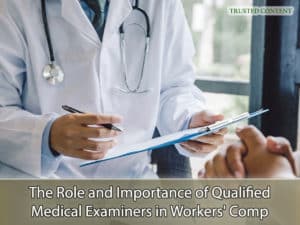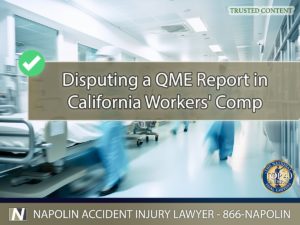Disputing a QME Report in California Workers’ Compensation
Workers' compensation in California serves as a crucial safety net for employees injured on the job. It's a system designed to provide financial and medical support to those who have suffered workplace injuries. However, navigating this system can be complex, especially when there's a disagreement with the findings of a Qualified Medical Examiner (QME). Understanding the intricacies of disputing a QME report is essential for any worker facing this challenge. This article aims to guide injured workers through the process, ensuring they are well-informed about their rights and options.

The Role and Importance of Qualified Medical Examiners in Workers' Compensation
The Role and Importance of Qualified Medical Examiners in Workers' Compensation
Qualified Medical Examiners are integral to the California workers' compensation system. They are licensed physicians who have received special certification to evaluate work-related injuries and illnesses. The primary role of a QME is to provide an unbiased medical opinion on the nature and extent of an injured worker's condition. Their assessments are crucial in determining eligibility for workers' compensation benefits. Understanding the role of QMEs helps injured workers prepare for and respond to their evaluations effectively.
The QME Evaluation: What to Expect
The QME evaluation is a critical step in the workers' compensation claim process. During this evaluation, the QME will conduct a thorough medical examination and review the injured worker's medical history. They will assess the injury's severity, its impact on the worker's ability to perform their job, and the necessary treatment. It's important for workers to be prepared for this evaluation, as the QME's report significantly influences the outcome of their compensation claim.
Challenges with Unfavorable QME Reports
An unfavorable QME report can be a significant hurdle in a worker's compensation claim. Such a report might conclude that the injury is not as severe as claimed or not work-related. This can lead to a denial of benefits or a reduction in the compensation amount. Understanding the common reasons for unfavorable reports and the implications they carry is crucial for workers facing this situation.

Legal Strategies in Disputing a QME Report
Legal Strategies in Disputing a QME Report
Disputing a QME report requires a strategic legal approach. Workers have the right to challenge the findings if they believe the report is inaccurate or unfair. This often involves gathering additional medical evidence, seeking a second opinion, or presenting a case for reevaluation. Legal representation can be invaluable in navigating this process, as experienced attorneys understand the nuances of workers' compensation law and can advocate effectively on behalf of the injured worker.
Navigating the Workers' Compensation QME Appeal Process
The appeal process in workers' compensation cases can be complex and daunting. It typically involves filing a formal appeal, preparing for a hearing, and possibly proceeding to trial. Each step requires careful preparation and a clear understanding of the legal arguments and evidence needed to challenge the QME's findings. An experienced workers' compensation attorney can guide injured workers through this process, ensuring their rights are protected and their case is presented compellingly.

Disputing a QME Report in California Workers' Compensation
Disputing a QME Report in California Workers' Compensation
Navigating the complexities of workers' compensation in California, particularly when disputing a QME report, can be challenging. Understanding your rights and the available legal avenues is crucial for a successful outcome. If you're facing difficulties with your workers' compensation claim, don't hesitate to seek professional legal assistance. Contact Napolin Accident Injury Lawyer at (866)-NAPOLIN for a free consultation. Our team, with extensive experience in workers' compensation cases, is committed to advocating for your rights and ensuring you receive the fair compensation you deserve.
- Safely and Legally Navigating Parking Lots in California - July 15, 2024
- Navigating the Aftermath of a Highway Auto Accident in California - July 15, 2024
- An Overview of California's Commercial Truck Insurance Laws - July 15, 2024
